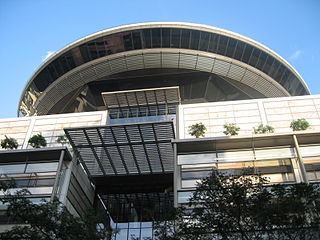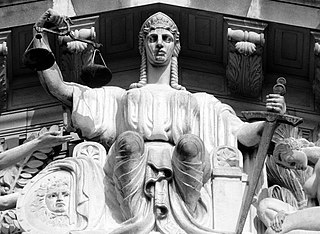
The doctrine of legitimate expectation was first developed in English law as a ground of judicial review in administrative law to protect a procedural or substantive interest when a public authority rescinds from a representation made to a person. It is based on the principles of natural justice and fairness, and seeks to prevent authorities from abusing power.
Australian administrative law defines the extent of the powers and responsibilities held by administrative agencies of Australian governments. It is basically a common law system, with an increasing statutory overlay that has shifted its focus toward codified judicial review and to tribunals with extensive jurisdiction.

Canadian administrative law is the body of law that addresses the actions and operations of governments and governmental agencies in Canada. That is, the law concerns the manner in which courts can review the decisions of administrative decision makers such as a board, tribunal, commission, agency, or Crown minister, while exercising ministerial discretion.
Judicial review is a part of UK constitutional law that enables people to challenge the exercise of power, usually by a public body. A person who contends that an exercise of power is unlawful may apply to the Administrative Court for a decision. If the court finds the decision unlawful it may have it set aside (quashed) and possibly award damages. A court may impose an injunction upon the public body.

Brandy v Human Rights and Equal Opportunity Commission (HREOC) was a case before the High Court of Australia determining that the HREOC could not validly exercise judicial power. The High Court maintained a firm position against attempts to confer judicial powers upon non-judicial bodies.

Council of Civil Service Unions v Minister for the Civil Service[1984] UKHL 9, or the GCHQ case, is a United Kingdom constitutional law and UK labour law case that held the royal prerogative was subject to judicial review.

Plaintiff S157/2002 v Commonwealth, also known as 'S157', is a decision of the High Court of Australia.

Errors as to precedent facts, sometimes called jurisdictional facts, in Singapore administrative law are errors committed by public authorities concerning facts that must objectively exist or not exist before the authorities have the power to take actions or make decisions under legislation. If an error concerning a precedent fact is made, the statutory power has not been exercised lawfully and may be quashed by the High Court if judicial review is applied for by an aggrieved person. The willingness of the Court to review such errors of fact is an exception to the general rule that the Court only reviews errors of law.

Administrative law in Singapore is a branch of public law that is concerned with the control of governmental powers as exercised through its various administrative agencies. Administrative law requires administrators – ministers, civil servants and public authorities – to act fairly, reasonably and in accordance with the law. Singapore administrative law is largely based on English administrative law, which the nation inherited at independence in 1965.

Illegality is one of the three broad headings of judicial review of administrative action in Singapore, the others being irrationality and procedural impropriety. To avoid acting illegally, an administrative body or public authority must correctly understand the law regulating its power to act and to make decisions, and give effect to it.

Threshold issues are legal requirements in Singapore administrative law that must be satisfied by applicants before their claims for judicial review of acts or decisions of public authorities can be dealt with by the High Court. These include showing that they have standing to bring cases, and that the matters are amenable to judicial review and justiciable by the Court.

Exclusion of judicial review has been attempted by the Parliament of Singapore to protect the exercise of executive power. Typically, this has been done though the insertion of finality or total ouster clauses into Acts of Parliament, or by wording powers conferred by Acts on decision-makers subjectively. Finality clauses are generally viewed restrictively by courts in the United Kingdom. The courts there have taken the view that such clauses are, subject to some exceptions, not effective in denying or restricting the extent to which the courts are able to exercise judicial review. In contrast, Singapore cases suggest that ouster clauses cannot prevent the High Court from exercising supervisory jurisdiction over the exercise of executive power where authorities have committed jurisdictional errors of law, but are effective against non-jurisdictional errors of law.
Fettering of discretion by a public authority is one of the grounds of judicial review in Singapore administrative law. It is regarded as a form of illegality. An applicant may challenge a decision by an authority on the basis that it has either rigidly adhered to a policy it has formulated, or has wrongfully delegated the exercise of its statutory powers to another body. If the High Court finds that a decision-maker has fettered its discretion, it may hold the decision to be ultra vires – beyond the decision-maker's powers – and grant the applicant a suitable remedy such as a quashing order to invalidate the decision.
The failure of a public authority to take into account relevant considerations and the taking of irrelevant ones into account are grounds of judicial review in Singapore administrative law. They are regarded as forms of illegality.

Procedural impropriety in Singapore administrative law is one of the three broad categories of judicial review, the other two being illegality and irrationality. A public authority commits procedural impropriety if it fails to properly observe either statutory procedural requirements, or common law rules of natural justice and fairness.
South African administrative law is the branch of public law which regulates the legal relations of public authorities, whether with private individuals and organisations or with other public authorities, or better say, in present-day South Africa, which regulates "the activities of bodies that exercise public powers or perform public functions, irrespective of whether those bodies are public authorities in a strict sense." According to the Constitutional Court, administrative law is "an incident of the separation of powers under which the courts regulate and control the exercise of public power by the other branches of government."

An ouster clause or privative clause is, in countries with common law legal systems, a clause or provision included in a piece of legislation by a legislative body to exclude judicial review of acts and decisions of the executive by stripping the courts of their supervisory judicial function. According to the doctrine of the separation of powers, one of the important functions of the judiciary is to keep the executive in check by ensuring that its acts comply with the law, including, where applicable, the constitution. Ouster clauses prevent courts from carrying out this function, but may be justified on the ground that they preserve the powers of the executive and promote the finality of its acts and decisions.

Minister for Immigration and Citizenship v SZMDS, is a landmark Australian judgment of the High Court. The matter related to immigration law, jurisdictional error and illogicality as a ground of judicial review.
In Canada, judicial review is the process that allows courts to supervise administrative tribunals' exercise of their statutory powers. Judicial review of administrative action is only available for decisions made by a governmental or quasi-governmental authority. The process allows individuals to challenge state actions, and ensures that decisions made by administrative tribunals follow the rule of law. The practice is meant to ensure that powers delegated by government to boards and tribunals are not abused, and offers legal recourse when that power is misused, or the law is misapplied. Judicial review is meant to be a last resort for those seeking to redress a decision of an administrative decision maker.

R v SS for Environment, Transport and the Regions [2001] UKHL 23 is a UK constitutional law case, concerning judicial review.











